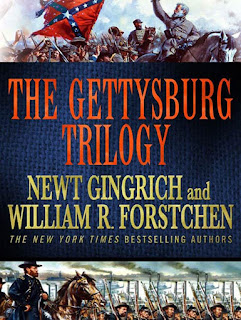The "Alt-Right" and "Alternate History": The Illusory Connection
A little while back, I wrote about my
concern that the growing (and legitimate) backlash against the Trump
administration’s embrace of “alternative facts” might bode ill for the field of
alternate history – if for no other reason than the growing stigmatization of
the adjective “alternative.”
Here’s more evidence for concern:
First, there is the publication of a new
Slate article, “Alt-Right
Facts,” complaining (again legitimately) about CPAC trying to create an “alternate history”
about the origins of the “alternative right” (alt-right) by effacing the
relationship between Steve Bannon, Richard Spencer, and Breitbart News.
Second, there is a new article on the
progressive website, Alternet, that appears to smear the popularity of
alternate history novels on the far right by linking it to a broader agenda of
political upheaval.
The article, entitled "Trump's Advisers Want a Civil War," by Paul Mason, focuses specifically on the
genre of Civil War alternate histories.
The key sections read as follows:
“Although it
comprehensively lost the American civil war, the racist right in the US has for
decades consoled itself by reading crazed “alternate history” novels, in which
things turn out differently. Now, Time magazine has revealed that Steve Bannon, the White
House chief of staff and Donald Trump’s closest aide, believes the next phase
of American history should be as catastrophic and traumatic as the
conflict of 1861-65.
“What
if ...” stories about the civil war entered popular literature in the 50s,
about the time the Jim Crow system of apartheid was being challenged by black
protesters. Ward Moore’s 1953 novel, Bring the Jubilee, has the Confederacy
winning the war but freeing the slaves. So does If the South Had Won the Civil
War, an imaginary history by leftwing writer McKinlay Kantor, published in
1960. In these and other 20th-century explorations of Confederate victory
fantasy, the south wins but is forced to end slavery in order to unleash
industrial capitalism. The subtext is not hard to decipher: the war between
white American brothers was pointless, as economic development would have
solved the problem of slavery anyway.
However,
after the 80s, the new American right saw things differently. Newt
Gingrich, then speaker of the House, now close
supporter of Trump, took time out from impeaching Bill Clinton to co-author
three excruciatingly dire alt-history novels about the civil war. In Never Call
Retreat, the final in the trilogy, written by Gingrich with William Forstchen
and Albert Hanser, the Union side wins the war but, by implication, the south
wins the peace. With Sherman’s Union army poised to destroy Atlanta, the
Confederate commander, Robert E Lee, persuades the south to surrender. “The
patience of our opponents is at an end,” this fictional Lee tells the
Confederate government. “We shall reap a terrible whirlwind that will scar our
nation for generations to come.” Lincoln then delivers the Gettysburg address
to a nation that has, by implication, made peace with the slaveowners and the
ideology of white supremacy they lived by.
While
you ponder the parallels with today, consider this statement from Bannon, made
on his radio show in December 2015 to explain the worldview of his Breitbart
website: “It’s war. It’s war. Every day, we put up: America’s
at war, America’s at war. We’re at war.”
For Bannon, the No 1
enemy in this “war” is Islam, with China No 2. But there is also a fifth column
in America to be dealt with as part of a “global existential war”. For
Bannon, this fits into a generational theory of American power whereby the
nation fulfils its destiny through a cycle of catastrophic crises: first, the
revolution of 1776, then the civil war, then the intervention into the second
world war and finally the crisis Bannon intends to provoke through Trump.
In Bannon and Gingrich,
then, you have two men influencing the most powerful office in the world whose
beliefs about the dynamics of US history could be best described as dangerous
bullshit. Bannon fantasises about turning the culture war into a real one;
Gingrich about the survival of an undestroyed south.”
From
my perspective this analysis doesn’t help us very much. Not only does it misread Moore’s Bring the Jubilee (which was actually
written as a left-wing indictment of American racism). It throws the baby of “what if?”
thinking out with the bathwater that the alt-right has seemingly dirtied. I am as suspicious of the Trump administration
is the folks at Slate and Alternet.
But I maintain that it is important to defend counterfactual and
alternate history from efforts to stigmatize it as politically suspect. As I have argued frequently, exploring “what
if?” scenarios is politically ecumenical; it is neither right nor left.



Comments